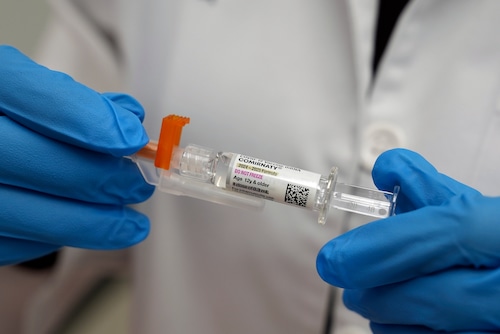It’s that time of year when people start talking about the upcoming holidays and that trend.
The latest data from the Centers for Disease Control and Prevention shows that although the actual start of winter has not yet arrived, overall rates of COVID-19, flu, and RSV are gradually increasing nationwide.
Pennsylvania is experiencing an increase in seasonal diseases, which is consistent with the national trend.
The CDC reports that overall COVID, flu, and RSV rates in Pennsylvania are moderate, and that the number of patients with the big three seasonal respiratory infections in ERs is increasing.
According to the head of a major hospital emergency room in central Pennsylvania, his department is currently treating more patients with gastrointestinal disorders.
Viral diseases are on the rise. According to Dr. Jed Zeigler, medical director of the emergency department at Penn State Health Holy Spirit Medical Center, COVID and the flu have not yet reached this area.
Similar to respiratory diseases, seasonal situations like holiday parties and crowded shopping centers, where people are indoors and in close proximity to one another, lead to increased rates of stomach viruses.
According to Zeigler, there has been an increase in respiratory disease patients in his emergency room, but this is typical for this time of year.
In addition to the typical cases we see, every emergency room in the country experiences significantly higher loads throughout the winter, he said, and every health system has grappled with these. If a patient has a gastrointestinal ailment and requires rehydration, or if they are elderly and have heart problems or COPD, we might have to admit them with RSV.
In order to ease the strain on hospitals, Zeigler expressed optimism that the surge of instances of seasonal illnesses will be distributed evenly. According to him, they only come around once a year. All I can hope is that they don’t all arrive at once.
More pupils are already missing school due to seasonal illnesses in the neighborhood.
Elaine Rampulla, head of nursing for Carlisle Area School District, said she has noticed an increased rate of absenteeism due to illness but it s not unusual for December.
“This time of year, you see that a lot,” she remarked. It’s something else if it’s not one thing. We’ve had children out with COVID, strep throat, and other gastrointestinal illnesses.
A few weeks ago, the primary illness was pneumonia, she said. Knock on wood that it has settled down, Rampulla said. We appreciate the break. It keeps the germs away, of course they see everyone in their families and spread it to them.
The good news, according to the CDC, is that the winter virus season is likely not have a higher number of combined hospitalizations from COVID-19, influenza, and RSV compared to last year.
However, peak hospitalizations from all respiratory viruses remain likely to be much higher than they were before the emergence of COVID-19, the agency said.
Here s how to protect yourself:
Become vaccinated. Annual flu and COVID-19 vaccines are now recommended for everyone.
The RSV vaccine is recommended for those over 65 and those under 65 with weakened immune systems or underlying respiratory conditions. However, it s important for parents to protect young children because RSV is thenumber onecause of hospitalization among infants. Most of the time RSV is mild but it can become serious among children under 5.
Practicinggood hand hygieneis criticalto preventing the spread of seasonal illness.
Wash your handsfrequently and thoroughly with warm soapy water for at least 20 seconds or use sanitizer if you don t have access to water.
Don t touch your face.Touching one s face with hands that have been on an infected surface is a primary way illnesses spread.Use a tissue when you sneeze and if you don t have a tissue use your arm, not your hands.
Wear a mask or stay homeif you have symptoms of respiratory disease.
The state Department of Health recommends taking COVID tests if you think you have COVID-19 and seeking treatment to reduce the chances of being hospitalized.
Every household is eligible for four free at-home COVID tests through the federal government. Order testshere.
Staff writer Ivey DeJesus contributed to this article.
Stories by
Amy Worden
.
Note: Every piece of content is rigorously reviewed by our team of experienced writers and editors to ensure its accuracy. Our writers use credible sources and adhere to strict fact-checking protocols to verify all claims and data before publication. If an error is identified, we promptly correct it and strive for transparency in all updates, feel free to reach out to us via email. We appreciate your trust and support!

